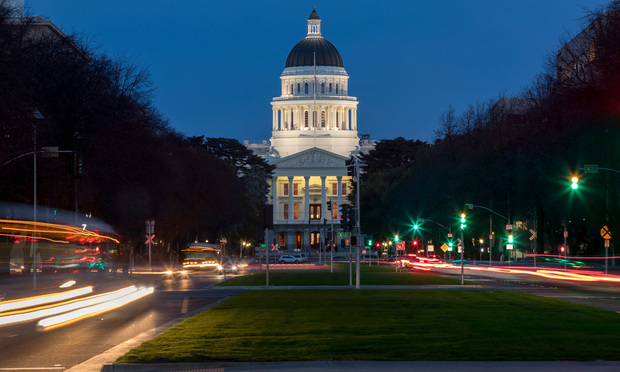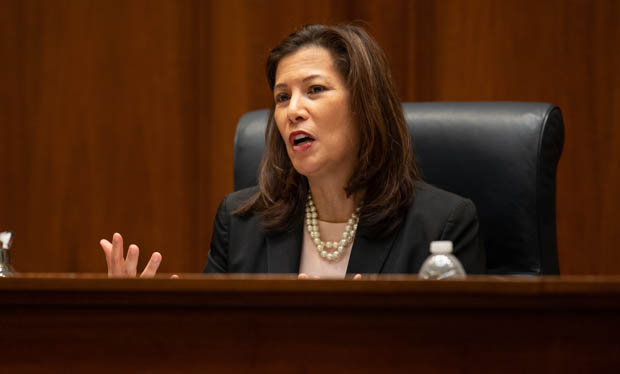Lawmakers Advance Jury Selection Reforms, as Some Judges Fume on Sideline
The bill, AB 3070, would bar the use of peremptory challenges to remove potential jurors on the basis of race, ethnicity and gender.
June 16, 2020 at 10:35 PM
5 minute read
 Sacramento State Capitol building on Capitol Way. Credit: Jason Doiy/ALM
Sacramento State Capitol building on Capitol Way. Credit: Jason Doiy/ALM
Legislation aimed at rooting out the discriminatory use of peremptory challenges in California jury selection sailed through the state Assembly on Friday without a hint of an intense debate taking place over the bill behind the scenes.
Since late May, the legislation has been the source of pointed exchanges among the Alliance of California Judges, other jurists and Assembly leaders over the role judicial officers should play in ensuring representative juries are chosen. The debate has played out as state judiciary leaders maneuver through public outrage at the death of George Floyd while in police custody and ethical canons that urge restraint in public comments.
The bill in question is AB 3070, authored by Assemblywoman Shirley Weber, D-San Diego. The measure would bar the use of peremptory challenges to remove potential jurors on the basis of race, ethnicity and gender. The bill would require attorneys trying to strike a would-be juror to show by clear and convincing evidence that their rationale is not related to the person's group identity. Appellate courts would be required to review the strikes de novo.
The bill is backed by the California Public Defenders Association and several social justice groups. The California District Attorneys Association opposes it.
 Chief Justice of California Tani G. Cantil-Sakauye. (Photo: Jason Doiy/ALM)
Chief Justice of California Tani G. Cantil-Sakauye. (Photo: Jason Doiy/ALM)The Judicial Council has not taken a position on AB 3070. In January, Chief Justice Tani Cantil-Sakauye, citing actions in other states, pledged to create a working group to study discrimination in jury selection. The chief justice has not yet named the group as branch leaders have been consumed with work related to the pandemic, a spokesman said. Weber said she will not wait for the chief justice to act.
On May 22, the Alliance of California Judges, an organization directed by 19 active and retired judges around the state, sent an email to fellow bench officers. The directors warned that Weber's bill is "nothing more than an attempt to 'stack' the jury with jurors who will not try the case fairly, based on the law and the facts, simply because they are members of a protected class."
The alliance is distinct from the older and larger California Judges Association. The alliance was formed during the last recession and has been a vocal critic of centralized judicial branch administration and, at times, the chief justice. The California Judges Association, which is reviewing the legislation, has not taken a public position.
The alliance's May 22 email called the bill an "insult" to experienced trial judges and a "meddling in the business of the court."
On May 26, one day after Floyd's death, Sacramento County Superior Court Judge Steve White, president of the alliance, sent Weber a less-barbed letter calling AB 3070 "unworkable."
"We know our branch's history," the letter said. "We are aware of the shameful role that discrimination has played in our justice system, particularly in jury selection. We disagree, however, with the assumption that the current system is ineffective."
California's bench has grown more diverse and judges now take coursework in recognizing implicit bias, White wrote.
"By subjecting our rulings on peremptory challenges to de novo review, denying them any deference whatsoever, this bill implies that our on-the-scene assessments of attorney credibility aren't trustworthy," the letter continued. "We deeply resent these implications."
White concluded the letter by saying he was willing to discuss the alliance's concerns with the assemblywoman.
On June 9, the Alliance received a six-page reply signed by Assembly Speaker Anthony Rendon, Weber, and the chairmen of the Judiciary and Public Safety committees, Mark Stone and Reggie Jones-Sawyer. The signatories appeared angry with the alliance's letter and the sharp words in its May 22 email to other judges.
"It requires a response, reflecting the legislative deliberation that your letter dismisses as 'meddling in the business of the court,'" the lawmakers wrote. "In attacking the legislative branch, your letter embarrasses the Alliance and even the judicial branch, in its failure to address the facts and jurisprudence regarding the use of peremptory challenges in jury selection."
The letter from lawmakers presented details of research suggesting ongoing issues related to jury selection and the exclusion of minorities. It cites the writings of U.S. Supreme Court Justice Stephen Breyer and California Supreme Court Justice Goodwin Liu, who have both questioned the use of peremptory strikes and the processes for challenging them.
"The makeup of juries provides one of the reasons that the nation lacks confidence in the justice system's fairness," the lawmakers wrote. "Protests show that our people are frustrated and angry at law enforcement and the justice system. It is our responsibility to address that frustration and anger."
A quick reply by White on June 10 said that he has asked Weber for a meeting.
"Despite our differences about the merits of AB 3070, we have a common goal: the elimination of racism and bigotry in our criminal justice system," he wrote.
An aide for Weber on Tuesday acknowledged receiving the judge's letter but said that no meeting date has been set yet.
AB 3070 is awaiting a policy committee hearing in the Senate.
This content has been archived. It is available through our partners, LexisNexis® and Bloomberg Law.
To view this content, please continue to their sites.
Not a Lexis Subscriber?
Subscribe Now
Not a Bloomberg Law Subscriber?
Subscribe Now
NOT FOR REPRINT
© 2025 ALM Global, LLC, All Rights Reserved. Request academic re-use from www.copyright.com. All other uses, submit a request to [email protected]. For more information visit Asset & Logo Licensing.
You Might Like
View All



DOJ, 10 State AGs File Amended Antitrust Complaint Against RealPage and Big Landlords
4 minute readTrending Stories
- 1'It's Not Going to Be Pretty': PayPal, Capital One Face Novel Class Actions Over 'Poaching' Commissions Owed Influencers
- 211th Circuit Rejects Trump's Emergency Request as DOJ Prepares to Release Special Counsel's Final Report
- 3Supreme Court Takes Up Challenge to ACA Task Force
- 4'Tragedy of Unspeakable Proportions:' Could Edison, DWP, Face Lawsuits Over LA Wildfires?
- 5Meta Pulls Plug on DEI Programs
Who Got The Work
Michael G. Bongiorno, Andrew Scott Dulberg and Elizabeth E. Driscoll from Wilmer Cutler Pickering Hale and Dorr have stepped in to represent Symbotic Inc., an A.I.-enabled technology platform that focuses on increasing supply chain efficiency, and other defendants in a pending shareholder derivative lawsuit. The case, filed Oct. 2 in Massachusetts District Court by the Brown Law Firm on behalf of Stephen Austen, accuses certain officers and directors of misleading investors in regard to Symbotic's potential for margin growth by failing to disclose that the company was not equipped to timely deploy its systems or manage expenses through project delays. The case, assigned to U.S. District Judge Nathaniel M. Gorton, is 1:24-cv-12522, Austen v. Cohen et al.
Who Got The Work
Edmund Polubinski and Marie Killmond of Davis Polk & Wardwell have entered appearances for data platform software development company MongoDB and other defendants in a pending shareholder derivative lawsuit. The action, filed Oct. 7 in New York Southern District Court by the Brown Law Firm, accuses the company's directors and/or officers of falsely expressing confidence in the company’s restructuring of its sales incentive plan and downplaying the severity of decreases in its upfront commitments. The case is 1:24-cv-07594, Roy v. Ittycheria et al.
Who Got The Work
Amy O. Bruchs and Kurt F. Ellison of Michael Best & Friedrich have entered appearances for Epic Systems Corp. in a pending employment discrimination lawsuit. The suit was filed Sept. 7 in Wisconsin Western District Court by Levine Eisberner LLC and Siri & Glimstad on behalf of a project manager who claims that he was wrongfully terminated after applying for a religious exemption to the defendant's COVID-19 vaccine mandate. The case, assigned to U.S. Magistrate Judge Anita Marie Boor, is 3:24-cv-00630, Secker, Nathan v. Epic Systems Corporation.
Who Got The Work
David X. Sullivan, Thomas J. Finn and Gregory A. Hall from McCarter & English have entered appearances for Sunrun Installation Services in a pending civil rights lawsuit. The complaint was filed Sept. 4 in Connecticut District Court by attorney Robert M. Berke on behalf of former employee George Edward Steins, who was arrested and charged with employing an unregistered home improvement salesperson. The complaint alleges that had Sunrun informed the Connecticut Department of Consumer Protection that the plaintiff's employment had ended in 2017 and that he no longer held Sunrun's home improvement contractor license, he would not have been hit with charges, which were dismissed in May 2024. The case, assigned to U.S. District Judge Jeffrey A. Meyer, is 3:24-cv-01423, Steins v. Sunrun, Inc. et al.
Who Got The Work
Greenberg Traurig shareholder Joshua L. Raskin has entered an appearance for boohoo.com UK Ltd. in a pending patent infringement lawsuit. The suit, filed Sept. 3 in Texas Eastern District Court by Rozier Hardt McDonough on behalf of Alto Dynamics, asserts five patents related to an online shopping platform. The case, assigned to U.S. District Judge Rodney Gilstrap, is 2:24-cv-00719, Alto Dynamics, LLC v. boohoo.com UK Limited.
Featured Firms
Law Offices of Gary Martin Hays & Associates, P.C.
(470) 294-1674
Law Offices of Mark E. Salomone
(857) 444-6468
Smith & Hassler
(713) 739-1250






